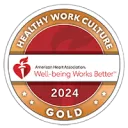You took an unexpected detour. This page does not exist. Get back on the right path here.

UK King's Daughters is proud to have met American Heart Association criteria for Gold recognition in the Association's Workforce Well-being Scorecard. Learn more.
UK King’s Daughters is an Affirmative Action/Equal Employment Opportunity Employer. Each person shall be considered solely on the basis of qualifications, without regard to race, color, sex, religion, national origin, age, disabilities, or veteran status. We are committed to working with and providing reasonable accommodations to qualified individuals with disabilities in all aspects of employment. We comply with all state and federal laws concerning the employment of persons with disabilities so as not to discriminate against them. If you need reasonable accommodation in order to apply for a job, please contact our Human Resources Team at (606) 408-4408.
© 2025 UK King's Daughters





